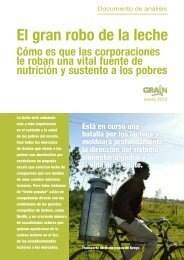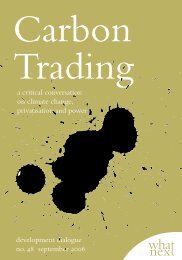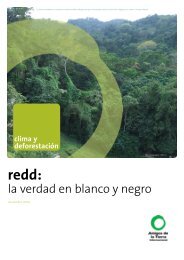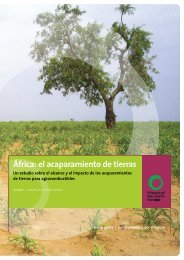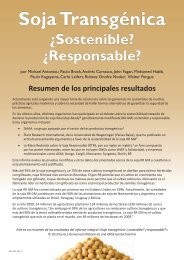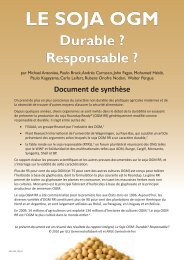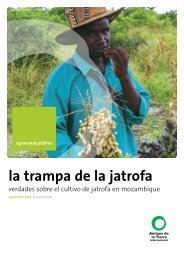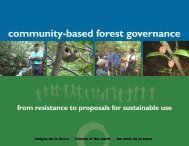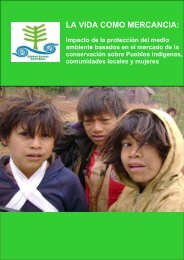Plantations, poverty and power - Critical Information Collective
Plantations, poverty and power - Critical Information Collective
Plantations, poverty and power - Critical Information Collective
Create successful ePaper yourself
Turn your PDF publications into a flip-book with our unique Google optimized e-Paper software.
136<br />
plantation itself need not comply with all of FSC’s Principles <strong>and</strong> Criteria, but by conserving forest<br />
outside the plantation the plantation manager can “offset” this non-compliance.<br />
The Board of Directors’ proposed revisions to the Principles <strong>and</strong> Criteria propose deleting criterion 6.3.<br />
Sure enough, the proposed amendments explicitly allow offsetting of the impacts of operations: “Each<br />
impact shall be linked with a description of how <strong>and</strong> where in the management unit the impact is<br />
prevented, mitigated or remedied.” So, a plantation company could wipe out the biodiversity in its<br />
plantations, but “mitigate” this by establishing a strictly protected forest area in another part of its forest<br />
management unit. This amounts to a double whammy for local people: excluded from the l<strong>and</strong> where the<br />
plantations are established <strong>and</strong> excluded from the forest which is protected to “offset” the impacts of the<br />
plantation.<br />
The <strong>Plantations</strong> Review Policy Working Group appeared determined to make it as easy as possible for<br />
industrial tree plantations to remain certified. The Policy Working Group suggests, for example, that FSC<br />
should introduce a “Social Management System” which forest <strong>and</strong> plantation managers could use “to<br />
address social issues in forest <strong>and</strong> plantation management, which certification bodies would then be able<br />
to audit”. This proposal overlooks the fact that local communities are sometimes in direct opposition to<br />
plantation managers. In some cases, it can be extremely dangerous for them to speak out against<br />
plantation companies. To suggest that the plantation managers simply need to refer to a Social<br />
Management System is ludicrous.<br />
According to the Policy Working Group, plantation managers are to be responsible for “consultation”.<br />
FSC’s Certifying Bodies are supposed to be able “to determine if consent has been ‘manufactured’” <strong>and</strong><br />
whether “the manager’s research into the local community has identified all affected parties”. But<br />
plantation managers have little interest in uncovering problems with their plantation operations.<br />
Meanwhile, determining whether all affected parties have been identified <strong>and</strong> whether consent has been<br />
manufactured could require months <strong>and</strong> years of study – certainly longer than the few days that FSC’s<br />
Certifying Bodies spend assessing plantation operations.<br />
The Board of Directors’ revisions to the Principles <strong>and</strong> Criteria suggest introducing a requirement for a<br />
Social Management Plan, to include “tenure <strong>and</strong> use rights, indigenous peoples rights, community<br />
relations <strong>and</strong> worker rights, local development, dispute resolution <strong>and</strong> stakeholder consultation.” The<br />
document is to be produced by the company. The certifying body is to monitor the Social Management<br />
Plan. The danger is that this could easily further exclude local people from the certification process.<br />
Instead of listening to local people, certifying bodies will refer to the Social Management Plan, regardless<br />
of the realities faced by local people.<br />
The Board of Directors proposes a new criterion 7.6: “Forest <strong>and</strong> plantation management shall<br />
proactively implement <strong>and</strong> document appropriate public consultation <strong>and</strong> communication processes with<br />
affected <strong>and</strong> interested parties.” Once again, the risk is that certifying bodies will check what the<br />
company says it does, rather than speaking to local people to find out what it is actually doing. In a<br />
situation where communities are living in fear of a plantation company which has taken over their l<strong>and</strong>,<br />
local people are unlikely to risk speaking in public to a certifying body hired by the company, any more<br />
than they would risk speaking to the company itself.<br />
In its final report, the <strong>Plantations</strong> Review Policy Working Group recommended that “FSC develops one



